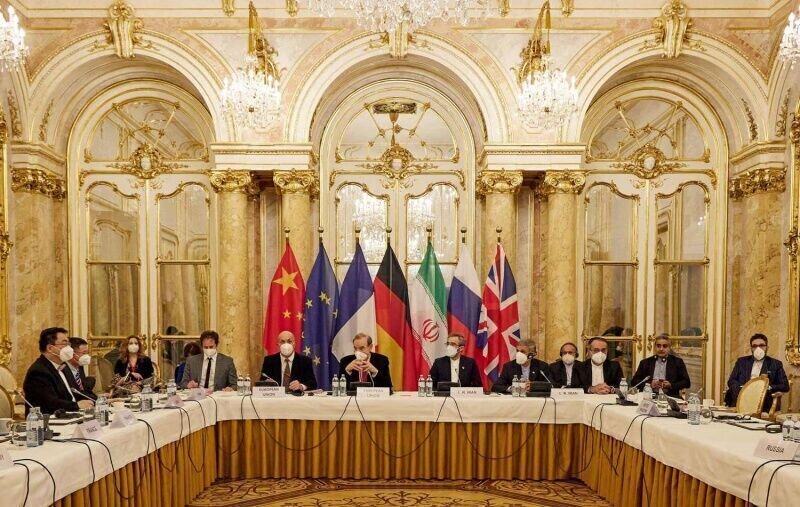Iran didn’t cross its red lines in Vienna talks: MP

TEHRAN – A senior Iranian lawmaker has provided more details about the briefing Iranian lawmakers received from the Foreign Ministry officials in charge of leading the negotiations in Vienna over the 2015 nuclear deal.
The lawmaker, Jalil Rahimi Jahan Abadi, who is sitting on the Parliament’s National Security and Foreign Policy Committee, said the committee members had a meeting with Foreign Minister Hossein Amir Abdollahian and Iran’s chief negotiator Ali Bagheri Kani, IRNA reported on Wednesday.
Jahan Abadi said part of the meeting was dedicated to discussing whether Iran’s red lines were crossed in the Vienna talks. “According to the reports provided by Mr. Abdollahian and Mr. Bagheri, the red lines of the system have not been crossed in any way in the Vienna talks,” the lawmaker said.
He pointed out that in the meeting late on Monday, Bagheri and Amir Abdollahian explained the issues that were agreed upon in the Vienna talks and the obstacles and differences that exist.
They answered some of the questions raised by the lawmakers. The deputy foreign ministers and their experts also briefed members of the parliamentary committee on developments in Afghanistan, Pakistan, Iraq and Yemen.
Regarding the approach of the minister of foreign affairs and the head of the negotiating team on how Iran was close to the agreement, Jahan Abadi said, “According to the foreign minister and his deputies and Mr. Bagheri, Iran is making every effort to resolve this issue honestly and is in the negotiations with the intention of reaching an agreement.”
He added, “The Western side, as it claims or was expected, does not cooperate in most matters and their behavior is dishonest, which originates from the public opinion of these countries.”
The lawmaker noted, “The main problem for the United States is that it withdrew from JCPOA. Now that they are back in the negotiations, they have to tell their public opinion, the media, and the U.S. Congress what they have achieved in the years since they left the JCPOA. But the fact is that they did not achieve anything. The United States not only has not achieved anything since leaving the JCPOA, but even Iran's position has become stronger and more coherent in recent years than when the United States was present in the JCPOA. After the U.S. withdrew from the JCPOA, Iran, by implementing the Strategic Action Act for Lifting Sanctions, achieved success in manufacturing centrifuges, enriching uranium and…. And Iran sat at the negotiating table with having the upper hand. This caused problems for the Americans, who had no answer for leaving the JCPOA.”
He added, “There is in fact no draft text until there is a draft text that is agreed upon by all parties.”
The Leader of the Islamic Revolution, Ayatollah Seyed Ali Khamenei, touched on the negotiations in his Tuesday speech delivered at meeting with senior government officials.
Referring to the good direction pursued by the diplomacy of the country, he said, “The officials should not wait at all for the nuclear issue to be resolved. Based on the realities of the country, they should plan and take action to solve the problems in the country.” Ayatollah Khamenei described the officials in charge of the negotiations as being revolutionary, pious, diligent individuals, according to the khamenei.ir.
Expressing his satisfaction with the resistance of the negotiating team to the other sides’ aggression and avarice, the Leader of the Islamic Revolution stated, “The other side withdrew from the JCPOA and broke its commitments. Now they feel helpless and have reached a dead end. But the Islamic Republic will pass through this stage as it has passed through many stages before this by relying on its people.”
The United States withdrew from the JCPOA in May 2018. But after the election of Joe Biden in 2020, Washington expressed a willingness to rejoin the nuclear pact. Since April 2021, negotiations over how to get the U.S. back into the JCPOA have been underway with no tangible success. Iran has said that the main obstacle to concluding the talks is the excessive demands that the U.S. keeps presenting in the talks.
Also, Ayatollah Khamenei shone a light on the need to be fair and act in good faith when criticizing the officials.
“There is no wrong with criticizing the officials’ behaviors. But criticism should have an optimistic view and be free of distrust. No one should be distrustful of an official who is on the front line,” the Leader remarked.
Ayatollah Khamenei added, “As I have frequently said before, such opinions should not cause the people to lose hope.”
Leave a Comment